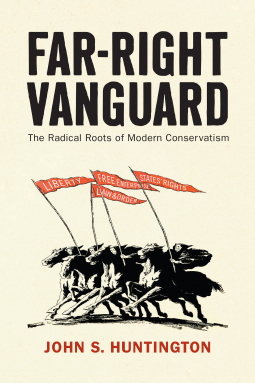
Far-Right Vanguard
The Radical Roots of Modern Conservatism
by John S. Huntington
This title was previously available on NetGalley and is now archived.
Send NetGalley books directly to your Kindle or Kindle app
1
To read on a Kindle or Kindle app, please add kindle@netgalley.com as an approved email address to receive files in your Amazon account. Click here for step-by-step instructions.
2
Also find your Kindle email address within your Amazon account, and enter it here.
Pub Date Oct 29 2021 | Archive Date Oct 12 2021
Talking about this book? Use #FarRightVanguard #NetGalley. More hashtag tips!
Description
The history of the ultraconservative movement, its national network, and its influence on Republican Party politics
Donald Trump shocked the nation in 2016 by winning the presidency through an ultraconservative, anti-immigrant platform, but, despite the electoral surprise, Trump's far-right views were not an aberration, nor even a recent phenomenon. In Far-Right Vanguard, John Huntington shows how, for almost a century, the far right has forced so-called "respectable" conservatives to grapple with their concerns, thereby intensifying right-wing thought and forecasting the trajectory of American politics. Ultraconservatives of the twentieth century were the vanguard of modern conservatism as it exists in the Republican Party of today.
Far-Right Vanguard chronicles the history of the ultraconservative movement, its national network, its influence on Republican Party politics, and its centrality to America's rightward turn during the second half of the twentieth century. Often marginalized as outliers, the far right grew out of the same ideological seedbed that nourished mainstream conservatism. Ultraconservatives were true reactionaries, dissenters seeking to peel back the advance of the liberal state, hoping to turn one of the major parties, if not a third party, into a bastion of true conservatism.
In the process, ultraconservatives left a deep imprint upon the cultural and philosophical bedrock of American politics. Far-right leaders built their movement through grassroots institutions, like the John Birch Society and Christian Crusade, each one a critical node in the ultraconservative network, a point of convergence for activists, politicians, and businessmen. This vibrant, interconnected web formed the movement's connective tissue and pushed far-right ideas into the political mainstream. Conspiracy theories, nativism, white supremacy, and radical libertarianism permeated far-right organizations, producing an uncompromising mindset and a hyper-partisanship that consumed conservatism and, eventually, the Republican Party.
Ultimately, the far right's politics of dissent—against racial progress, federal power, and political moderation—laid the groundwork for the aggrieved, vitriolic conservatism of the twenty-first century.
Advance Praise
"Historians have inherited a paradigm which holds that before American conservatism could win power, it had to purge its extremes. Works like John S. Huntington's are shattering it: he establishes that ultraconservatives were the point of the spear. This is a thorough and thoughtful revision of what it meant to be 'conservative' in twentieth-century America."
—Rick Perlstein, author of Reaganland: America's Right Turn, 1976-1980
"It is well past time for a serious exploration of the roots of the far right, and in this deeply researched, thoughtful, and smartly argued book, John S. Huntington delivers it. The topic is, of course, extremely timely: the far right has more political power, and is receiving more journalistic attention, than at any time in recent memory, with consequences that will reverberate for decades to come. But apart from its timeliness, the subject is an essential component of the history of conservatism, one that not only needs more attention but needs to be put more explicitly in conversation with a historiography that focuses perhaps too much on 'respectable conservatism.' For these reasons, Far-Right Vanguard is essential reading."
—Nicole Hemmer, author of Messengers of the Right: Conservative Media and the Transformation of American Politics
Available Editions
| EDITION | Other Format |
| ISBN | 9780812253474 |
| PRICE | $74.95 (USD) |
Average rating from 6 members
Featured Reviews
 Reviewer 602942
Reviewer 602942
A must read for those interested in understanding the roots of today's acerbic, populist conservatism.
John S. Huntington, a professor of history at Houston Community College, offers an in-depth revisionist history of ultraconservatism in the United States in the second half of the twentieth century. Traditionally, academics have attributed the success of the modern Republican Party beginning in the 1980s to the ability of mainstream Republican leaders to hold in check extremist elements within the party. Thus, the party's recent extremist turn in the twenty-first century was seen as an aberration or as a novel development without precedent. In Far-Right Vanguard, Huntington challenges this traditional narrative of the modern Republican Party by detailing how over the decades the party's platform, agenda, and strategies have been shaped by the far right, even as earlier mainstream leaders tried to distance the party from ultraconservative's most xenophobic and racist views.
Just as Qanon, far-right media commentators, and militia groups have forced so-called "respectable" Republicans today to grapple with their concerns and in the process incorporate them into mainstream politics, so too did the campaigns of earlier ultraconservative groups, such as the John Birch Society, Christian Crusade, and For America shape mainstream conservatism. This conservatism, which initially crossed party lines, by the end of the 1960s found an exclusive home within the Republican Party. Dixiecrats, social traditionalists, evangelical fundamentalists, and other ultraconservative groups felt betrayed first by Roosevelt's promotion of social welfare programs in the 1930s and later by the Democratic party's increasing embrace of unionism and civil rights in the 1960s and 1970s. With the Republican Party's 1964 nomination of ultraconservative Barry Goldwater, some conservatives within the Democratic Party, including South Carolina's Strum Thurmond and Texas's J. Evetts Haley, switched allegiance to the Republican Party. Explaining his decision, Strum Thurmond declared that the Democratic Party had "invaded the private lives of people" while fostering "lawlessness, civil unrest, and mob actions." He also described Lyndon Johnson as a "traitor to the South." This heated rhetoric found its way into countless 1964 Republican Party pamphlets, not to mention became the subject of numerous best-selling paperback books (sold at airports and on newstants) by conservative pundits of the era, including those by Phyllis Schlafly (A Choice, Not an Echo) and by John A Stormer (None Dare Call it Treason).
Obviously, there was no internet or social media at this point, so the reach of these vitriolic texts was not as widespread as it would have been today. But the extreme rhetoric contained in these texts was eerily like that heard during and following the 2016 and 2020 election cycles. When Johnson defeated Goldwater by a landslide, contemporary commentators described his defeat as the death knoll for extreme conservatism in the United States, and for a decade this seemed to be the case. But as Huntington notes, Johnson's landslide victory obscured from view the fact that ultraconservatism was growing in the United States, even if it could not yet win elections. The 1964 election witnessed the emergence of a new generation of far-right activists who had solidified their influence over the Republican base and over party machinery. Not to mention for the first time since the Civil War, the Republican Party carried several Southern states. The defeat, rather than discouraging the far right, excited them, because roughly 27 million Americans had voted for a far-right candidate.
Huntington does an excellent job of showing the connections between far-right conservatism of the mid-twentieth century and the far-right conservatism that increasingly determines the direction of the current Republican Party. As Huntington elucidates, once the Republican Party became the party of conservatism, moderate leaders despite multiple efforts never succeeded in marginalizing extremist elements because ultimately, they drew from the same ideological well. Thus, while they tried to tone down the rhetoric of the far right, that is, white supremacy, social traditionalism, and xenophobia, they never disavowed these ideologies. In short, the only thing that has changed in the twenty-first century is that ultraconservatives within the party now have a firm grip on power. Rather than spewing their vitriol from the margins in hopes that some mainstream Republicans would translate their positions into policy, ultraconservatives now advance their conspiracy theories about the Covid-19 vaccination, the 2020 election, and the January 6th insurrection from within the halls of government.
 richard b, Reviewer
richard b, Reviewer
If you wish to read a micro-history of far-right extremist thought this is your book. For me, it was only tedious and boring. My advice-- skip it.
Some recommend that the audience should not read the book and just skip it. I am of a different opinion - the book is good to read, especially if you are interested in politics and political ideas and movements.
The book examines the influence of the far-right in American politics, their development, and ideology. But the book can also be read as historical material.
I am undoubtedly the target audience for this book: I studied far-right European politics. While I enjoyed it immensely, I understand that the average reader might not. It is certainly a dense text. I would recommend something lighter for someone hesitant to dive into an academic text on this matter (perhaps The Twilight of Democracy by Anne Applebaum). Back to Huntington's book: the outline of how radical right politics took off in the United States Huntington provides is comprehensive—and amusing to me, as it so clearly is an echo of a global trend. I highly recommend this book for any reader interested in gaining an understanding of the development of populist extreme right radicalism; particularly in the face of our rapidly polarizing political state, this is an incredibly important book.





